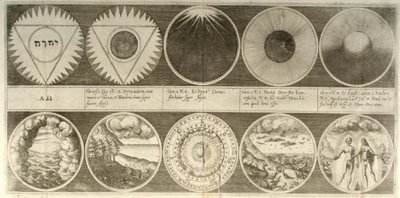







 All of the above amazing engravings comes from the alchemical emblemata work, 'Hermetico-Spagyrisches Lustgärtlein'. Click the images for full sized versions.
All of the above amazing engravings comes from the alchemical emblemata work, 'Hermetico-Spagyrisches Lustgärtlein'. Click the images for full sized versions.“The one hundred and sixty hermetick emblems [are] attributed to the heroes of alchemy, historical and mythical, famous and anonymous".


The above 'draco' images come from the 'Lambspring book' (an earlier hand painted set) - I think the engravings here are a reissue by the same publisher Lucas Jennis; as the 'Lambspring book' was released in the same year of publication as 'Dyas Chymica Tripartita', 1625: from where these engravings derive.


 I'm afraid I don't remember in which of the 7 works contained in 'Dyas Chymica Tripartita' (compiled by Johann Grasshoff ) these illustrations are found. The full book is online at Herzog August Bibliothek, Wolfenbüttel. Wonderfully obscure.
I'm afraid I don't remember in which of the 7 works contained in 'Dyas Chymica Tripartita' (compiled by Johann Grasshoff ) these illustrations are found. The full book is online at Herzog August Bibliothek, Wolfenbüttel. Wonderfully obscure.Between this post and the last entry, more than half of the engravings in the 250+ page book have been uploaded. A few of the remaining illustrations contain symbology more obviously occult in nature.
Previously: alchemy, emblemata.
A little more on images 1-9 here & 1-3 below: these were previously printed in the Opus medico-chymicum of Johann Daniel Mylius, which was published by Lucas Jennis in Frankfurt in 1618. They are taken from a section of this 3000-page opus entitled Basilica philosophica—Klossowski de Rola attributes the engravings therein to Merian. The 160 ‘Seals of the Philosophers’ printed in the third book of the Basilica philosophica were apparently ‘composed and freely adapted from manuscript sources, as well as from previously engraved work.’
ReplyDeleteImage #12 above is from the title page of Michael Maier’s Tripus aureus, mentioned in my note below, & #13 is another illustration from the ‘Twelve Keys’ section of this book.
Image #14 is an engraving by one Balthazar Schwan, previously published in Mylius’s 1622 book ‘Philosophia reformata.’
Thanks very much for the background misteraitch.
ReplyDeleteYou mentioned the '1-stop shop for alchemy' which reminds me that part of the confusion I laboured under looking around online for some more info. is due to Jennis releasing another alchemy compendium book in 1625 which also included a couple of the same 'tractus' as here.
I *think* it was called 'Musaeum Hermeticum' or similar. There was mention at Levity and also that french site (that I call 'hellboy' - just because it is outrageous to navigate around).
The writing in the illustration on the top-left from image no. 1 seems to be the Hebrew tetragramatton, YHVH.
ReplyDeleteYeah, I think it's also in the 2nd image (click to enlarge).
ReplyDeleteThe tetragrammaton is closely entwined with Kabbalistic and hermetic traditions it seems.
You're right, I missed that one.
ReplyDelete